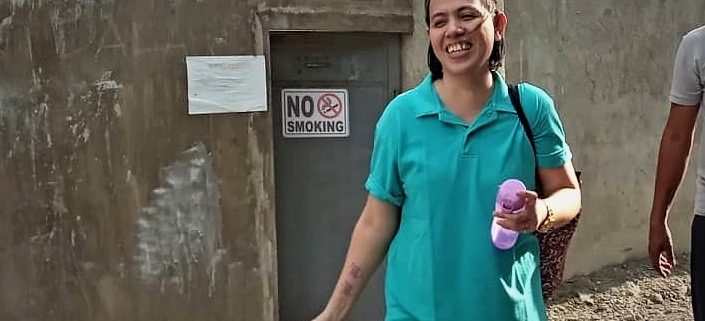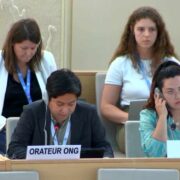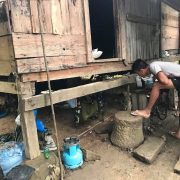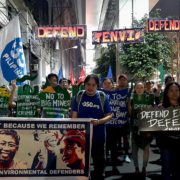Miradel walks free, unites with son she gave birth to under detention
After five years behind bars, Maria Miradel Torres will finally reunite with her son she gave birth to in prison.
Miradel walked out from Camp Bagong Diwa Tuesday afternoon, July 23, no longer wearing an inmate’s orange garb but an aquamarine shirt and a huge smile.

She was acquitted of murder and frustrated murder charges her lawyers and supporters said are trumped up.
Miradel was four-months pregnant when she was arrested by the Criminal Investigation and Detection Group (CIDG) and the Southern Luzon Command of the Armed Forces of the Philippines (AFP) on June 20, 2014.
The police and the soldiers did not present a warrant of arrest and searched the entire house without a search warrant when she was snatched.
Later, an alias warrant of arrest was presented, issued by the court on the very day of her so-called arrest.
A Gabriela member in Mauban town, Miradel was charged with murder and frustrated murder at the Infanta Regional Trial Court (RTC) in Quezon.
Miradel denied that she was a murderer.
“I cannot even kill a mosquito. There is no truth to the crime they are accusing me of,” she told Bulatlat.com in 2014.
When the police swooped down on her relatives’ house where she was staying, Miradel was suffering from profuse bleeding and was seeking medical treatment.
Her difficult pregnancy was exacerbated by the poor maternal and pre-natal health care inside the country’s prisons.
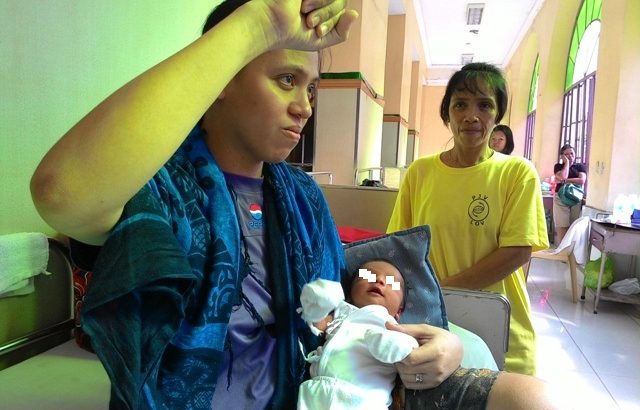
Miradel gave birth to her son Payter on November 17, 2014, at the Philippine General Hospital. She was only allowed to be with her child for six months, two months in the hospital and four months in jail thereafter.
Miradel’s bail petitions to allow her to take care of her infant had been repeatedly denied by the Infanta RTC.
When her infant son was taken away from her, what followed was five years of agony.
Karapatan secretary general Cristina Palabay witnessed how Miradel suffered but chose to fight her unjust imprisonment.
“We saw her pain with her difficult pregnancy while in detention, her joy when she nursed little Payter in the hospital, their heartbreaking separation when jail officials decided to disallow Payter’s stay in jail despite his need for his mother’s breastmilk and care, her parents’ unbending determination to support their daughter, and Miradel’s own resolve to fight on,” Palabay said.
Human rights worker Jose Mari Callueng visited Miradel at Bagong Diwa’s “female dormitory” several times.
“[During]…the many times I visited Miradel at the female dorm of Camp Bagong Diwa in Taguig, she would always talk about her son and how she looked forward to the day when she can give him countless hugs and kisses,” Callueng said.
Finally, though, Miradel is reunited with her son. But many women political prisoners, some of whom mothers with little children, still languish in jail.
“There are 545 political prisoners in the Philippines, 65 of them are women, some are mothers with little children. There are 13 couples who are political prisoners, with children and/or grandchildren longing for their immediate release,” Palabay said.
Miradel’s freedom, however, is a cause for celebration for human rights workers.
“At most times, we witness the sorrows of the families of political prisoners when their loved ones get arrested, tortured, and detained for years. It is excruciatingly painful to see how they are given the run-around by the police and military to locate their loved ones, how they have to work doubly hard to have enough money for pamasahe (fare money) to see them in jail and to bring some bread or medicine that they need, how they hear the false testimonies in court accusing these dedicated and courageous individuals of crimes they did not commit, how their loved ones are maliciously painted as common criminals and terrorists,” Palabay said.
“But there are times that we witness big smiles, hearty thank you’s, joyful tears and pleasant hellos and goodbyes. Since yesterday, we witnessed these big smiles, hearty thank you’s, joyful tears and pleasant hellos and goodbyes,” she added of Miradel’s release.
“Let us not allow another good mother or father, or son or daughter, them who fight for the rights of the people, to be separated from their families again, and suffer anguish as the state imprison them on baseless trumped-up charges,” Callueng added. # (Raymund B. Villanueva)

